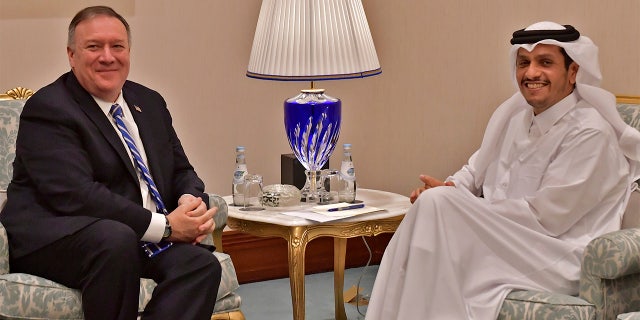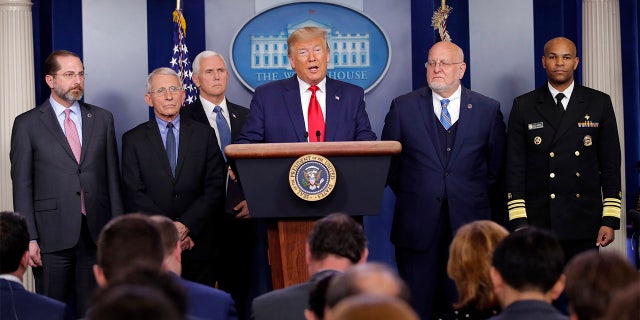Lindsey Graham on Taliban-U.S. peace deal: ‘Let’s give it a try’
South Carolina Republican Sen. Lindsey Graham told ‘Fox & Friends Weekend’ that America should proceed with caution, but ‘give it a chance’ nonetheless.
America should give the peace agreement with the Taliban a chance, Sen. Lindsey Graham, R-S.C., said Saturday.
In an interview on “Fox & Friends Weekend” with hosts Dean Cain, Pete Hegseth and Jedidiah Bila, Graham said he will believe there is peace when he sees it, but he wants to applaud President Trump for getting the Taliban to the table.
“Let’s give it a try,” he urged. “Eighteen years is a long time, but you’ve gotta remember why we still talk about Afghanistan… That’s the place where the Al Qaeda was invited in by the Taliban as their honored guests to attack us. Without a safe haven in Afghanistan, there would be no 9/11.”
After nearly two decades of conflict, the United States and the Taliban signed a peace agreement Saturday that is aimed at ending America’s longest war and will bring U.S. troops home more than 18 years after they invaded in the wake of the Sept. 11, 2001, terrorist attacks.
The deal, which was signed by chief negotiators and witnessed by Secretary of State Mike Pompeo in Doha, Qatar, could see the withdrawal of all American and allied forces in the next 14 months and allow the president to keep one of his key 2016 campaign pledges to extract the U.S. from an “endless war.”

From left, U.S. Secretary of State Mike Pompeo meets with Qatar’s Foreign Minister Sheikh Mohammed bin Abdulrahman Al Thani before a peace signing ceremony between the U.S. and the Taliban in Doha on Saturday, Feb. 29, 2020. The U.S. is poised to sign a peace agreement with Taliban militants on Saturday aimed at bringing an end to 18 years of bloodshed in Afghanistan and allowing U.S. troops to return home from America’s longest war. (Giuseppe Cacace/Pool photo via AP)
Under the deal, the U.S. would draw its forces down to 8,600 from 13,000 in the next three to four months — a number Graham told the “Friends Weekend” hosts was “enough.” A complete retraction would depend on the Taliban’s ability to meet its promises.
Another condition of the agreement calls for the release of 5,000 Taliban members from Afghan-run jails, although it was not clear if the Afghan government will comply with that.
Additionally, a senior administration official told reporters earlier this week that the deal “explicitly mentions al Qaeda” and calls for the Taliban to cut all ties.
“Today, we are realistic,” Pompeo told reporters. “We are seizing the best opportunity for peace in a generation.”
To date, according to The Associated Press, the United States has spent nearly $1 trillion in Afghanistan and more than 3,500 U.S. and coalition soldiers have died there. More than 2,400 of them were Americans.
Saturday’s agreement sets the stage for March 10 intra-Afghan talks in Oslo, with the aim of forming a power-sharing agreement between rival Afghan groups.
Pompeo said that while “the chapter of American history on the Taliban is written in blood,” the pact represented “the best opportunity for peace in a generation.”
Simultaneously, U.S. Defense Secretary Mark Esper and Afghan President Ashraf Ghani signed a joint statement committing the Afghan government to support the U.S.-Taliban deal.
However, not everyone was on board with the move.
Former National Security Adviser John Bolton attacked his former boss’s historic treaty, arguing it posed an “unacceptable risk to American civilians.”
“Signing this agreement with Taliban is an unacceptable risk to America’s civilian population,” Bolton tweeted on Saturday.
“This is an Obama-style deal,” he wrote, referring to Trump’s predecessor. “Legitimizing Taliban sends the wrong signal to ISIS and al Qaeda terrorists, and to America’s enemies generally.”

President Donald Trump speaks about the coronavirus in the press briefing room at the White House, Saturday, Feb. 29, 2020, in Washington as Health and Human Services Secretary Alex Azar, National Institute for Allergy and Infectious Diseases Director Dr. Anthony Fauci, Vice President Mike Pence, Robert Redfield, director of the Centers for Disease Control and Prevention and U.S. Surgeon General Dr. Jerome Adams listen. (AP Photo/Carolyn Kaster)
In a news conference Saturday afternoon, the president hailed the deal and said he would be personally meeting leaders of the Taliban in the near future.
In addition, Trump said that Afghanistan’s neighbors should help maintain stability following the agreement.
Many expect the forthcoming intra-Afghan talks to be more complicated than the initial deal, but the president said he thought the negotiations would be a success because “everyone is tired of war.”
CLICK HERE FOR THE FOX NEWS APP
“The Taliban are part of Afghanistan. The Taliban didn’t attack us on 9/11, but they set the conditions for us to be attacked. They are very radical in their philosophy, but they don’t want to govern the world — they just want to take over Afghanistan,” Graham remarked.
“So, here’s what’s going to happen,” he said, “We’re going to have a negotiation with the Taliban who is at 15 percent approval, with the rest of Afghanistan. I’m looking for reconciliation that protects the rights of women and I’m looking for residual American force to stay in Afghanistan for a long time to make sure that ISIS-K and Al Qaeda never come back.”
“So, it is in our interests to have a footprint,” he concluded.
Fox News’ Paulina Dedaj, Sam Dorman, and The Associated Press contributed to this report.





Comments